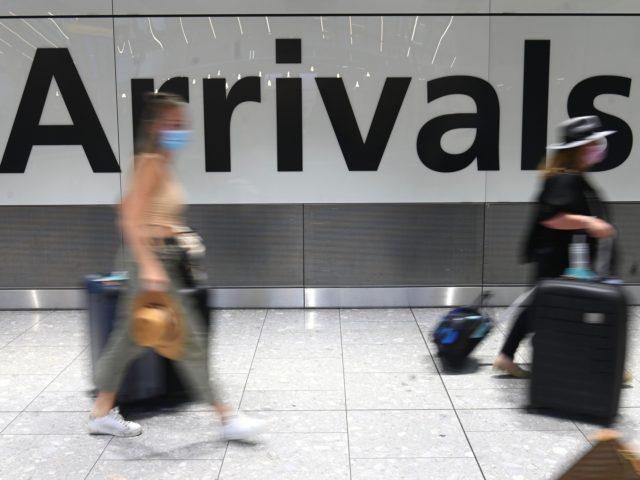Prime Minister Boris Johnson announced on Friday that the United Kingdom will be shutting down all travel corridors starting on Monday, in a move described by Brexit leader Nigel Farage as “ten months too late”.
Starting from 4 a.m. on Monday, the British government will remove quarantine-free travel exemptions for all countries, and those travelling to the country will be required to provide proof of a negative coronavirus test within 72 hours before departing.
Even with a negative coronavirus test, travellers will be required to self-isolate for ten days, or at least five days if they pass another coronavirus test.
The measures come amidst concerns of more mutated strains of the virus, with at least eleven Britons testing positive for the recently discovered Brazilian strain.
In response to the outbreak, travellers from South America, some of Central America, and Portugal have been banned from entering the United Kingdom, the Daily Mail reported.
Announcing the measures, Prime Minister Boris Johnson said: “What we’re doing now is taking steps that you’d expect to protect against the new variants because the situation now is we have a very high rate of domestic infection in the UK combined with a massive vaccination programme.
“At this crucial stage what we can’t have is new variants with unknown qualities coming in from abroad and that’s why we’ve set up the system to stop arrivals from places where there are new variants of concern and set up the extra tough measures that I’ve outlined.”
“It would be fatal if this sense of progress were now to breed any kind of complacency because the pressures on our NHS are extraordinary,” Johnson warned.
The travel restrictions are expected to be in place until at least February 15th, however, the government warned that it would continue to ban flights from countries in which new coronavirus strains are discovered.
The Government getting tough on foreign flights, it’s 10 months too late.
— Nigel Farage (@Nigel_Farage) January 15, 2021
In response to the announcement, Brexit leader Nigel Farage said: “The Government getting tough on foreign flights, it’s 10 months too late.”
The late timing of the imposition of travel restrictions was also criticised by Labour Party leader Sir Keir Starmer, who said: “I think many people will say ‘Why on earth didn’t this happen before?’ Many countries have taken this step before we did. Right step, but slow again.”
Unlike most countries, the United Kingdom kept its borders open during initial phases of the pandemic, with an estimated 100,000 people arriving per week through the nation’s airports during the first national lockdown.
At the time, Northern Irish epidemiologist Professor Gabriel Scally said: “The UK is an outlier… It is very hard to understand why it persists in having this open borders policy. It is most peculiar.”
While the move to restrict travel was praised by politicians, the restrictions come as a further blow to the country’s embattled aviation and tourism industries.
The chief policy director of the Confederation of British Industry (CBI), Matthew Fell, said: “While done with the best of intentions this will undoubtedly come as a further blow to the aviation industry, which has already suffered significantly during the crisis, highlighting the need for targeted fiscal support.”
Farage: We Imported Coronavirus Thanks to UK’s Lax Border Controls https://t.co/uti0g4ro2K
— Breitbart London (@BreitbartLondon) May 1, 2020
Follow Kurt Zindulka on Twitter here @KurtZindulka

COMMENTS
Please let us know if you're having issues with commenting.